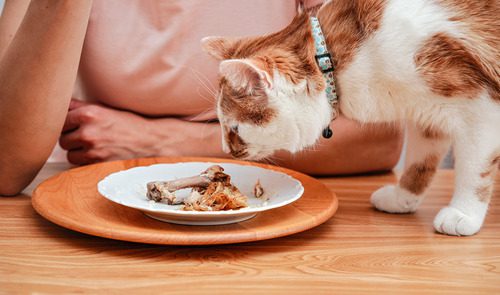My Cat Ate a Chicken Bone: What Do I Do?
Cats are naturally curious creatures, and their curiosity can sometimes lead them to nibble on things they shouldn’t. If your cat ate a chicken bone, it’s normal to feel worried. Chicken bones, especially when cooked, can pose serious risks to cats. In this blog, we’ll explore what steps you should take if your cat ingests a chicken bone, potential risks, signs to watch for, and when to contact your veterinarian.

Why Chicken Bones Are Dangerous for Cats
Chicken bones, particularly when cooked, become brittle and can splinter easily. These splinters can cause severe internal damage to your cat. The sharp fragments can puncture the gastrointestinal tract, leading to serious complications such as:
- Esophageal Obstruction: Bones can get stuck in the esophagus, causing choking and difficulty swallowing.
- Intestinal Blockage: Larger bone pieces can cause a blockage in the intestines, preventing normal digestion and bowel movements.
- Internal Bleeding: Sharp bone fragments can tear the stomach or intestines, leading to internal bleeding.
- Peritonitis: If a bone punctures the gastrointestinal tract, it can cause a life-threatening infection known as peritonitis.
Immediate Steps to Take
If you discover that your cat ate a chicken bone, the first thing to do is to remain calm. Panicking can make it harder to think clearly. Here are some immediate steps you should
- Remove Any Remaining Bones: If there are any chicken bones within your cat’s reach, remove them immediately to prevent further ingestion.
- Monitor Your Cat: Keep a close eye on your cat for any signs of distress or discomfort. Note any unusual behavior, such as excessive drooling, coughing, or difficulty breathing.
- Do Not Induce Vomiting: It’s important to avoid inducing vomiting unless instructed by a veterinarian. Inducing vomiting can cause the bone to lodge in the esophagus or cause further damage on its way back up.
Signs Your Cat Ate a Chicken Bone
After your cat has ingested a chicken bone, monitor them closely for any signs of complications. Some symptoms to watch for include:
- Choking or gagging
- Drooling or pawing at the mouth
- Vomiting or regurgitation
- Abdominal pain or swelling
- Lethargy or weakness
- Changes in appetite or bowel movements
When to Call the Veterinarian
If you notice any of the symptoms mentioned above, or if you’re unsure about your cat’s condition, it’s best to consult your veterinarian immediately. Contact 441 Animal Hospital in Boca Raton, Florida, at (561) 482-5600. Your veterinarian will perform a physical examination and may recommend diagnostic tests such as X-rays or ultrasounds to locate the bone and assess any damage. Depending on the severity and location of the bone, treatment may range from monitoring and supportive care to endoscopic removal or surgery.
Staying Vigilant
Even after addressing the immediate situation, it’s essential to keep a close watch on your cat’s health. Monitor their eating habits, bowel movements, and overall behavior. Any persistent changes or symptoms should prompt a follow-up visit to the veterinarian.
Safe Feeding Practices
To prevent future incidents of your cat eating chicken bones, consider the following tips:
- Supervise Meal Times: Ensure your cat cannot access bones during meal preparation or disposal.
- Proper Disposal: Dispose of chicken bones in a secure trash bin that your cat cannot access.
- Cat-Proof Your Home: Keep food and bones out of reach by storing them in cabinets or on high surfaces.
- Educate Household Members: Make sure everyone in the household understands the risks of feeding bones to pets.
Maintaining Your Cat’s Health and Safety
If your cat ate a chicken bone, taking swift and informed action is crucial. Understanding the risks, recognizing symptoms, and seeking veterinary care can help ensure your cat’s safety and well-being. For any concerns or emergencies, call 441 Animal Hospital at (561) 482-5600. Your cat’s health and happiness are our focus.